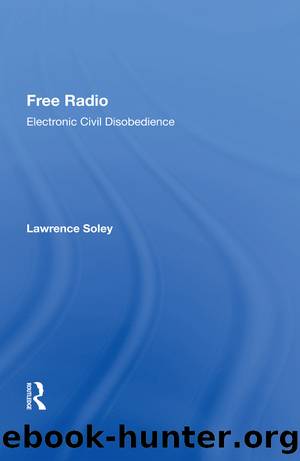Free Radio by Lawrence Soley

Author:Lawrence Soley [Soley, Lawrence]
Language: eng
Format: epub
Tags: History, General, Social Science, Sociology
ISBN: 9780429723865
Google: rtmiDwAAQBAJ
Publisher: Routledge
Published: 2019-04-10T01:35:07+00:00
Decaturâs Black Liberation Radio
The first station inspired by Kantakos example and the second micropower station to take to the air was Black Liberation Radio of Decatur, Illinois. Like Springfield, which is forty miles west, Decatur is a predominantly white city with an entrenched white power structure that perpetuates itself through at-large elections, ties to business, and a police force that doesnât hesitate to use brute force against political dissidents, minorities, and union workers, as demonstrated during the Caterpillar, Bridgestone, and Staley strikes.17
Started by Napoleon Williams and Mildred Jones on August 20, 1990, Black Liberation Radio broadcast from a studio in the coupleâs small west-side home using a less-than-one-watt Panaxis transmitter tuned to 107.3 MHz FM, a vacant frequency in the Decatur-Springfield radio market. The station was created to give Decaturâs African-American community uncensored access to the airwaves. A leaflet distributed in the African-American community to announce its sign-on reported that Black Liberation Radio would give âa voice to those who have no voice of their own through the mass media.â18
âWe want total community involvement, so anybody can be one the air,â said Williams about the stationâs philosophy. âIf you have a problem with the judicial system, you donât have to call Napoleon Williams and ask him, âWhat can you do?â You can come on and present your case to the people. There may be someone out there that will hear you, who has had the same problem and knows what to do.â19 In Williamsâs view, radio should operate like public access channels on cable television, where interested groups and individuals can produce and air programs.
Two weeks after Black Liberation Radio signed onâand started criticizing Macon County states attorney Lawrence Fichter for herding African-Americans through the judicial system like slaves through a plantation-era auctionâWilliams and Jones learned firsthand how justice was dispensed in Decatur. The couple had their house raided by police, were repeatedly arrested and jailed, and even lost custody of their daughter, Unique Dream. A journalist at the Decatur Herald & Tribune, the cityâs daily newspaper, acknowledged that the arrests and harassment give âthe appearance [the states attorney and police] are out to silence him [Williams]. Thatâs very obvious.â20 An African-American newspaper put it more bluntly, describing the actions as a âharassment campaignâ waged by âa white states attorney.â21
Then Williams was charged with fondling his ten-year-old daughter, whom he fathered with another woman. The Nation reported that âthere was uncertain evidence even according to the prosecutors, [so the charge] was reduced to battery on a plea bargain offered by Williams himself in exchange for release from prison and recovery of possessions confiscated when police invaded his home.â22
The next bizarre encounter occurred several weeks later, when Fichter asserted that Williams was hired to videotape the issuing of a gang contract for the killing of two narcotics officers. To get the videotape, members of the Police Emergency Response Team conducted a late-night, guns-drawn, battering ram invasion of the Williamsâs home on October 13, 1990, two months after Black Liberation Radio signed on.
Download
This site does not store any files on its server. We only index and link to content provided by other sites. Please contact the content providers to delete copyright contents if any and email us, we'll remove relevant links or contents immediately.
| Automotive | Engineering |
| Transportation |
Whiskies Galore by Ian Buxton(42014)
Introduction to Aircraft Design (Cambridge Aerospace Series) by John P. Fielding(33128)
Small Unmanned Fixed-wing Aircraft Design by Andrew J. Keane Andras Sobester James P. Scanlan & András Sóbester & James P. Scanlan(32800)
Craft Beer for the Homebrewer by Michael Agnew(18245)
Turbulence by E. J. Noyes(8049)
The Complete Stick Figure Physics Tutorials by Allen Sarah(7373)
The Thirst by Nesbo Jo(6944)
Kaplan MCAT General Chemistry Review by Kaplan(6933)
Bad Blood by John Carreyrou(6621)
Modelling of Convective Heat and Mass Transfer in Rotating Flows by Igor V. Shevchuk(6440)
Learning SQL by Alan Beaulieu(6290)
Weapons of Math Destruction by Cathy O'Neil(6279)
Man-made Catastrophes and Risk Information Concealment by Dmitry Chernov & Didier Sornette(6019)
Digital Minimalism by Cal Newport;(5764)
Life 3.0: Being Human in the Age of Artificial Intelligence by Tegmark Max(5558)
iGen by Jean M. Twenge(5415)
Secrets of Antigravity Propulsion: Tesla, UFOs, and Classified Aerospace Technology by Ph.D. Paul A. Laviolette(5371)
Design of Trajectory Optimization Approach for Space Maneuver Vehicle Skip Entry Problems by Runqi Chai & Al Savvaris & Antonios Tsourdos & Senchun Chai(5068)
Pale Blue Dot by Carl Sagan(5007)
